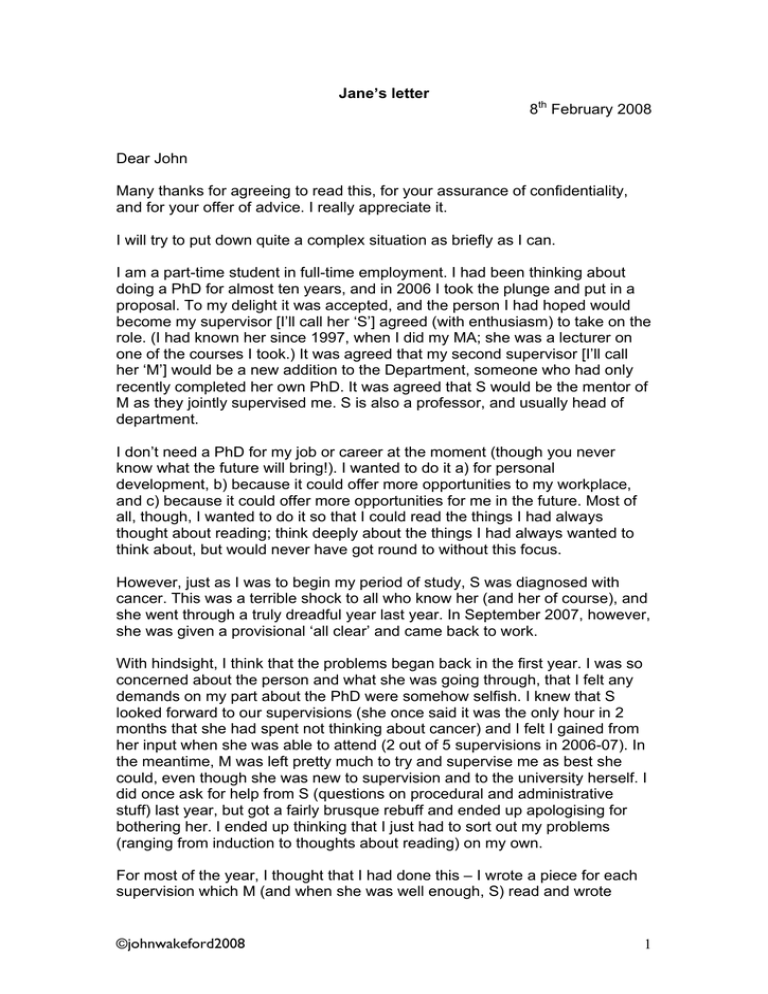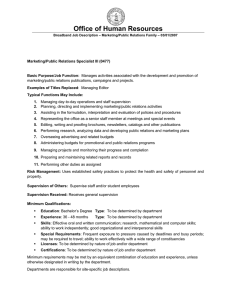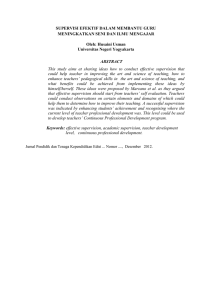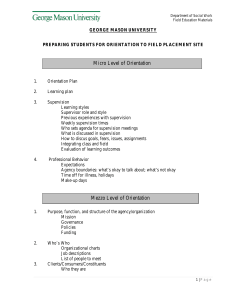8 February 2008 Dear John
advertisement

Jane’s letter 8th February 2008 Dear John Many thanks for agreeing to read this, for your assurance of confidentiality, and for your offer of advice. I really appreciate it. I will try to put down quite a complex situation as briefly as I can. I am a part-time student in full-time employment. I had been thinking about doing a PhD for almost ten years, and in 2006 I took the plunge and put in a proposal. To my delight it was accepted, and the person I had hoped would become my supervisor [I’ll call her ‘S’] agreed (with enthusiasm) to take on the role. (I had known her since 1997, when I did my MA; she was a lecturer on one of the courses I took.) It was agreed that my second supervisor [I’ll call her ‘M’] would be a new addition to the Department, someone who had only recently completed her own PhD. It was agreed that S would be the mentor of M as they jointly supervised me. S is also a professor, and usually head of department. I don’t need a PhD for my job or career at the moment (though you never know what the future will bring!). I wanted to do it a) for personal development, b) because it could offer more opportunities to my workplace, and c) because it could offer more opportunities for me in the future. Most of all, though, I wanted to do it so that I could read the things I had always thought about reading; think deeply about the things I had always wanted to think about, but would never have got round to without this focus. However, just as I was to begin my period of study, S was diagnosed with cancer. This was a terrible shock to all who know her (and her of course), and she went through a truly dreadful year last year. In September 2007, however, she was given a provisional ‘all clear’ and came back to work. With hindsight, I think that the problems began back in the first year. I was so concerned about the person and what she was going through, that I felt any demands on my part about the PhD were somehow selfish. I knew that S looked forward to our supervisions (she once said it was the only hour in 2 months that she had spent not thinking about cancer) and I felt I gained from her input when she was able to attend (2 out of 5 supervisions in 2006-07). In the meantime, M was left pretty much to try and supervise me as best she could, even though she was new to supervision and to the university herself. I did once ask for help from S (questions on procedural and administrative stuff) last year, but got a fairly brusque rebuff and ended up apologising for bothering her. I ended up thinking that I just had to sort out my problems (ranging from induction to thoughts about reading) on my own. For most of the year, I thought that I had done this – I wrote a piece for each supervision which M (and when she was well enough, S) read and wrote ©johnwakeford2008 1 comments on; I wrote up detailed notes after each supervision; and I read, attended training sessions, and gave a paper and ran a workshop at an international conference in Japan. In September 07, S came back to work, and in answer to a tentative question from me, she said that she wanted to continue supervising, and was happy to supervise me again. I had put together a portfolio of the work that I had produced so far, including a training log and all the pieces I had written. She read the most recent pieces and wrote her comments on them – they were all positive and constructive and no concerns or worries were raised. I should add that M had never raised any major concerns either, except to say in a note that she was worried about my reading back in June. In November 07, we had a supervision and all seemed to be going particularly well. Both supervisors pronounced themselves pleased with my work, said that I was writing well, and (as I understood it) they therefore suggested that the date of the Transfer should be brought forward from September 08 to June. I had done a pilot case study over the summer period, but had not properly got to grips with the data generated from that study by then. As I understood it, my task from that supervision to the next was to begin to transcribe and analyse the data itself. (There is a bit more detail to the story here, but for the sake of brevity I’ll cut that out. I’d be happy to elaborate if necessary.) As I worked on this task, I began to realise that it was really enormous: transcribing the recordings I had made took a long time, I was trying to do too much on too many fronts [I only realise this now!], and I rather lost my way in terms of the analytical framework. I began to worry that I was heading off in the wrong direction. In addition, from September onwards I had been going through a problematic time in my personal life - again, I won’t elaborate here, though it probably has a bearing on why I felt I’d lost my way, but I’m trying to keep this short. So, what to do? I thought the best thing to do was to send the work I had done so far: the transcriptions, and a document containing the bare bones of an outline for the work I wanted to do [mostly extracts from the transcriptions, with comments and questions that I wanted to ask about], but really not a polished piece of work by any means, and ask for guidance and advice in the next supervision. My big mistake, I think, was to send the submission late (2 days after the normal deadline). I sent it, however, with an apologetic e-mail, saying that I’d been having problems and that I would appreciate my supervisors’ guidance. I said that maybe we could use the document as a springboard for discussion, rather than follow the usual format in the supervision. In addition, on the Monday morning, an hour or two before the supervision, I sent an e-mail saying that I realised they might not have had time to read ©johnwakeford2008 2 what I had sent (it was 20 pages long!), and suggesting an alternative agenda for discussion, which included questions about data analysis, questions arising from a training session I had been on, questions about possible directions to take in the analysis etc. I don’t know if they got this e-mail, but I do know that as soon as I walked into the room I realised something was very wrong. S quickly became quite agitated, and began to insist that I should reduce my contracted hours in my job. She also seemed unable to remember what had been agreed in previous supervisions, and I felt ‘told off’ (a bit like in school) for not doing work which she thought should have been done. As I had asked in the November supervision which aspect I should prioritise, I became very confused and quite upset. It seemed as if every answer I gave was somehow wrong and this seemed to make her even more angry. I ended up almost crying (I’m 44 years old!) and telling her that I had had problems in my personal life. This seemed to mollify her for a moment, but soon she was off again. She kept saying that she was ‘shocked’ – certainly I felt shocked, both by her behaviour and by what she was saying. She also said things that directly contradicted her comments from previous supervisions (such as: ‘there is a conflict of interest between you writing an article to be published [I had done this in December as well as the transcribing] and your PhD work’, when in September she had suggested that it would be good to try and get something published). In the end I left the supervision quite distressed, and with no clear idea of what I was supposed to do next except that I should take a small section of the data and analyse that (but without a discussion of the analytical frameworks available). S pressed very hard to have the next supervision on 3rd March (we usually meet once every 2 months, which I think is about right for a part-time student), which was only 6 weeks away1. I went home feeling that my work was worthless and that I was clearly incapable of achieving the level required for a PhD student. The choice seemed to be: give up part of your job, or give up studying. Luckily, I have some very good friends and family, who rallied round and reminded me that I’m not that bad! I began to see that although the piece of work I had sent was not ‘good’, it was sent in a context of asking for help, and that I had not received that help. I spent the next few days feeling very upset, and unable to concentrate on either my studies or my work properly. I went for coffee with M, but felt unable to discuss what had happened because I might offend again (this time because I was biting back my anger). She did say that she thought the supervision had been ‘a bit rough’ but offered nothing more than that. 1 I usually send my work to my supervisors 4 working days before the supervision, though occasionally this is reduced to 2. Following the 4 day rule, that would give me just 5 weeks to work through my problems with the data, write it up, and submit it. ©johnwakeford2008 3 In the end, I thought it best to write to S and M, stating my concerns, and asking for clarification. I ended it by asking them if they could not only offer support, encouragement and guidance when things were going well for me, but also when I was encountering difficulties. I also stated that I thought the target and time-frame for the next supervision was unrealistic, given the size and complexity of the task, and strongly suggested that a date after Easter would be more feasible. I did not receive a reply. After a week, I sent another e-mail asking if they had received my letter, at which point I got a brief acknowledgement from M stating that they were considering their response. I thought about things over the weekend, and put together a series of what I thought could be constructive and positive suggestions for a way forward. I went to see the Post Graduate Tutor on Monday morning, explained the situation to her and showed her my letter. She told me, amongst other things: 1. That S was worried about her health again 2. That I was not alone (ie other people in the department had experienced something similar) 3. That my letter seemed sensible and constructive I therefore sent my ‘positive steps’ letter to S and M and waited for a response. Shortly afterwards, I received their response to my previous letter via M (I received an out-of-office reply from S’s e-mail saying she was on sick leave again). They claimed that the quality of my academic work ‘in total’ was not good enough and that they felt I should be studying 15-20 hours per week (this on top of my full time job). They claimed that they felt it was their duty to push me ‘irrespective of your other work/family commitments’. They said they could meet me ‘when you want’ but pointed out that they were away at the end of March/beginning of April respectively. They did not offer a suggestion for a suitable date themselves. This letter came as a total shock to me (as did the supervision). If my academic work was not good enough, why wasn’t I told before? I had left every supervision up until then with a positive feeling that although there was much more to do, I would be able to do it. I had felt that I was on track and moving in the right direction. The written comments I had received on the drafts I had sent up until January gave no indication of any concerns about my performance, indeed, in November the word ‘excellent’ was used2. Although I often raised the issue of trying to balance my job and my studying, I had up until that point been reassured by them that I was managing. We often talked about my reading, and I know that I should always be doing more, but I didn’t have a sense that I was failing on that front. In November, I believed it was agreed I should concentrate on the data over and above any literature review, yet in January I was criticised for not producing this in addition to the data. I don’t know if 15-20 hours per week is reasonable: I’ve been doing something more like 10-12 on average (more in some weeks, less in others). I don’t know if it is true that my academic work in total is really giving cause for 2 Ironically, I wrote this piece in 4 days flat at the height of my difficulties in my personal life! ©johnwakeford2008 4 concern, or if it is just that this one piece was not what they expected and they don’t know what to do with it. I take on board that I should probably be reading more – but I think probably it is more that I should be reading in a more focussed way, not just trying to swallow books wholesale. I now feel that I don’t want to be in the same room alone with S & M again. I don’t want to submit my work to them, particularly not if it is in embryonic form, for fear of another attack. (I should say, by the way, that when my work has been criticised before, I have always felt that it was constructive in intent, and that even if we disagreed about approaches, or ideas, that there was something to learn from someone with a very different perspective. I’m not averse to constructive criticism on academic grounds, but this time, I really don’t feel that this is the case). I am afraid that whatever I submit next time will not be good enough, and that no matter what I do I can’t succeed. It’s as if I’ve been set up to fail in advance. I feel afraid to ask for guidance, as if I can only ever present a nearly finished piece for discussion. Added to all this Angst, is the personal aspect. I considered S and M to be … if not close friends, at least people that I thought well of, and who I hoped would think well of me. I don’t want S to be ill; I don’t wish her ill (though it is hard to wish her well just now) and I don’t want to be a burden to her or to M. At the same time, I feel that what has happened is just not right somehow. So what to do next? I’m not sure if the trust that existed between me and my supervisors can be repaired. I think probably the best thing would be to try to find another supervisor, but the department is small and to my knowledge noone there is interested in my field – it would probably mean moving to another part of the university. That’s not impossible in itself – my work falls between two disciplines anyway - but there are more questions. How do you go about doing this? And how do you approach another supervisor when you’ve just been told that your work is not good enough? What are the procedures for doing this? Thousands of questions like this spring to mind, all based on what my friend said: is it like doctors’ surgeries – that word gets around that you are somehow a ‘bolshie student’ and so no-one will take you? Above all, how do you make sure that you don’t end up in a similar or worse situation than before? The other alternative, which is both tempting and appalling, is just to give up. I don’t know if I can work for 15-20 hours per week on top of my normal job for 5-7 years. It is likely that my responsibilities in my job will increase rather than decrease over time. I had originally planned to try to take a sustained period of unpaid leave during the writing up period of the PhD, but not for at least a year. Is the 15-20 hour estimate reasonable? At the same time, I think giving up would be a terrible waste of all the work I have done so far. Work which I didn’t think was too bad, though it could always have done with being improved in all sorts of ways. I would feel pretty disappointed if I gave up. But it may be better to do that now than to come to the same point again in 2 years’ time. ©johnwakeford2008 5 I’m sorry – this has turned into 5 pages, and I have tried to keep it short!!! It is a complex problem, though, and I wanted to do my best to be fair and try not to be unjust to anyone in my telling of it. If you have any advice for me, I would truly appreciate it. Best Wishes Jane Team tasks 1. Discuss what advice you would give to Jane and put the main points on the acetate provided 2. What lessons are there here for o Postgraduate research students? o Supervisors? o Departments/institutions? Please list them on the second acetate ©johnwakeford2008 6


